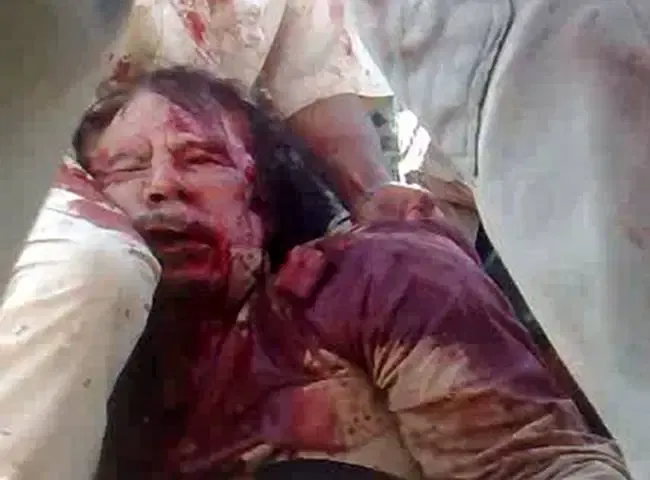One for the Status Quo
The Western media celebrates the grizzly death of another enemy who wouldn’t play ball.

I’ve frequently argued that entertainment media needs to be less violent, whilst news media ought to be more violent. The reason? Too often, action genres desensitise us to the effects of violence, and this is too often complemented by the absence of graphic reality in the news.
Take Iraq, for example: most viewers merely saw a veritable fireworks display in the Baghdad skies at the start of the illegal invasion by the Coalition of the Killing Willing. The United States, in particular – after the real downer that was the imagery of flag-draped coffins coming back from Vietnam – learnt its lesson in marginalising media coverage of war. Gradually, reporters were kept at bay and into press pools, for their safety, we were told.
Yet when a Reuters media crew were turned into a press pool of blood in an Iraqi hotel on April 8th of 2003 – apparently accidentally killed by Western forces – the response (from retired Marine Lt Gen Bernard E. Trainor) was, “There’s nothing sacrosanct about a hotel with a bunch of journalists in it.”
It’s important that we see the effects of war, so that we can comprehend its horror, and only allow it to commence when all diplomatic avenues have been exhausted. Tony Benn once suggested that all war represents a failure in diplomacy. It should never be taken lightly.
Yet still, war is covered by much mainstream media as just a regular occurrence that’s to be almost accepted. It isn’t a horrific outrage, or a scandal in itself; it’s depicted as an unavoidable battle between the good guys and bad guys in black-and-white perspectives but in living colour and high definition (so the fireworks look as good as the male newsreader with plastic greying hair alongside his female counterpart with youth still on her side).
But for the Libyan unrest, much of the establishment media decided to depart from their usual editorial approach.
Let us for a moment set aside the history behind the conflict. Let’s forget that Libyan leader Muammar Gaddafi vowed his own parents wouldn’t receive a home until everyone else did, and created a socialistic Islamic state with free universal electricity, newlywed support, 0% interest loans from state-owned banks, free farmland, greatly improved literacy rates, overseas education aid, strong welfare support. Let’s not remember how the West felt greatly threatened by these, and likewise Gaddafi, similar to so many others like him, became increasingly erratic, dictatorial, and aggressive as the world squared up to him. Let’s not recall how both Tony Blair and David Cameron spent periods of time assisting Gaddafi’s ability to terrorise, no matter how terrible he could be, provided he was an ally.
With such facts aside, we can look at what happened when Libya was torn apart and the usual suspects moved in from the global community (in particular the U.S. and U.K., with France on board this time). It followed the modus operandi used against Osama Bin Laden: the assumption that while certain people are terrorists flouting international law, “we” have some sort of God-given right to then reject such regulations ourselves in the pursuit of them.
Gaddafi was murdered. He didn’t face arrest, trial, or conviction for any crimes committed, just as Bin Laden didn’t, either. Perhaps Saddam Hussein’s much-censored diatribe in the kangaroo court he was subjected to was another lesson learnt of Vietnam casket proportions: even if you’re going to wipe them off the face of the earth anyway, for goodness sakes don’t allow them to embarrass us over our aiding and abetting them when it suited us.
You may have seen Gaddafi’s murder. Yes, in this case, it was just fine to show graphic images of “war.” After being located and pursued by U.S., U.K., and French forces, Gaddafi cowered in a tunnel, clearly surrendering, when he was dragged from it, beaten, pulled behind a vehicle, and then shot dead; his carcass dragged through the dirt roads.
Britain’s Sun newspaper, owned by the odious Mr Murdoch, declared, in all its thick, thuggish nationalism, “That’s for Lockerbie!” Yes, our consciences were apparently clear; he was dead; no discussion, debate, or drawn-out sentences or even analyses were to go on. The bad guy was gone, and we could be self-righteous even in aiding and abetting a horror we demonised him for. What’s most disturbing is that our consciences could be clear at all after witnessing – and, apparently, enjoying – the sight of any human being subjected to those final minutes.
It doesn’t matter that our government has funded, supported, and perpetuated “Lockerbies” all around the world for scores of years, and continues to do so. Murdoch’s national newspaper pushed the buttons, dispensed with shades of grey, and instead remained black and white, and read all over. That’s for Lockerbie? No. It’s one more for the status quo.
